Ocean Acidification
The National Sea Grant College Program (Sea Grant) funds research, education, and extension projects to improve community understanding of ocean and coastal acidification.
Industries depending on living marine resources are increasingly concerned about impacts of ocean acidification (OA) on marine ecosystems and subsequent social and economic impacts. Sea Grant funded research projects are designed to respond to stakeholder research questions and evaluate local environmental impacts and societal dependence on impacted species, to facilitate adaptive management strategies. As part of a broader NOAA-wide ocean acidification initiative, Sea Grant provides resource to coordinate regional and state efforts and clearly communicate how OA is affecting U.S. waters and living marine resources.
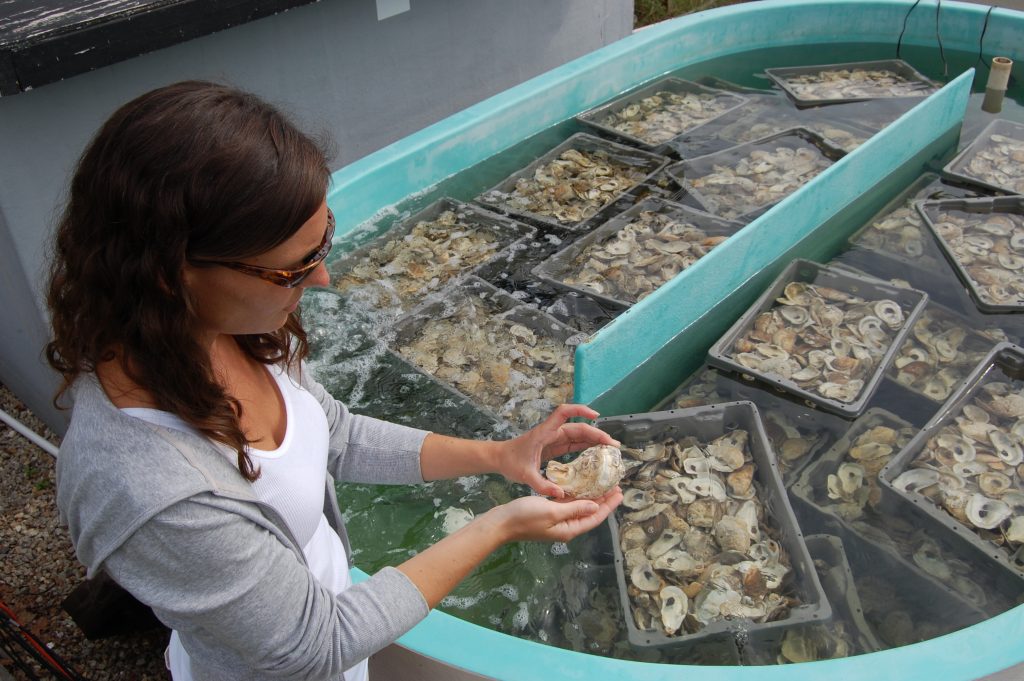
Meet the Experts














SINCE 2008, SEA GRANT HAS PROVIDED
$110,000,000
in research funding
Sea Grant provides this funding to support innovative research that furthers the understanding of the effects of OA and related impacts on coastal communities, economies, fisheries and ecosystems
Featured Ocean Acidification Impacts
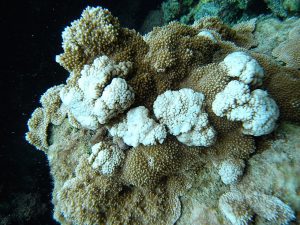

Hawai’i Sea Grant Research Studying Coral Reefs’ Tolerance to Climate Change Leads to Additional $1.2 M in Grants
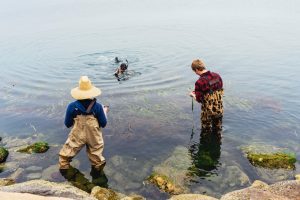

California Sea Grant Eelgrass Research Informs Decisions on Proposed State Legislation
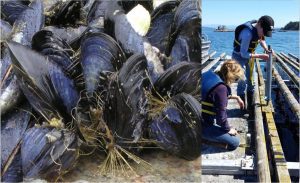

Washington Sea Grant Liason Assembles Scientific, Government, Legal and Stakeholder Communities to Address Ocean Acidification
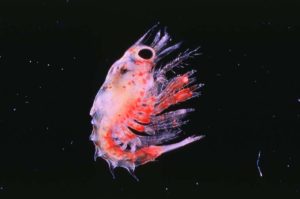

MIT Sea Grant: Understanding the Impacts of Changing Ocean Chemistry on Lobster Development
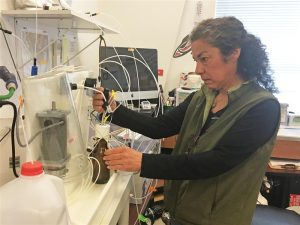

Sea Grant Leads the Way for Ocean Acidification Research in Alaska
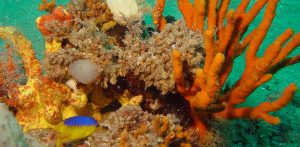

Georgia Sea Grant Funds Research to Understand Sensitivity of Invertebrates in Gray’s Reef NMS to Ocean Acidification
Sea Grant & Ocean Acidification Program Partnership
NOAA’s Ocean Acidification Program (OAP) and Sea Grant began a partnership in 2016 to prioritize and invest in regional ocean and coastal acidification research to help coastal communities better adapt to ocean change. This partnership has helped address regional priority research needs and increased regional awareness of OA concerns.
| Amanda Zahorik | Delaware Sea Grant | Ocean Acidification and microbially-mediated shell calcification in the Eastern oyster, Crassostrea virginica |
| Anthony Himes | Virginia Sea Grant | Influence of salinity history on future ocean acidification tolerance in larval Eastern oysters, Crassostrea virginica, in Chesapeake Bay |
| Caroline Schwaner | New York Sea Grant | Identifying Molecular Markers associated with Resilience to Ocean Acidification in the Eastern oyster and the Northern quahog |
| Elizabeth Wright-Fairbanks | New Jersey Sea Grant | Assessing the susceptibility of Atlantic sea scallops and surf clams to ocean acidification using glider-based monitoring and larval transport models |
| Fei Da | Virginia Sea Grant | Chesapeake Bay acidification: From daily forecasts to half-century projections |
| Teresa Schwemmer | New York Sea Grant | Physiology-based modeling of estuarine fishes and ecosystems under ocean acidification |
| Diana Padilla | New York Sea Grant | Flexing mussels: Does Mytilus edulis have the capacity to overcome effects of Ocean Acidification? |
| Bassem Allam | New York Sea Grant | Probing molecular determinants of bivalve resilience to ocean acidification |
| Richard Wahle | Maine Sea Grant | Genetic and phenotypic response of larval American lobster to ocean warming and acidification across new England’s steep thermal gradient |
| Hannes Baumann | Connecticut Sea Grant | Sensitivity of larval and juvenile sand lance Ammodytes dubius on Stellwagen Bank to predicted ocean warming, acidification and deoxygenation |
Ocean Acidification News


Assessment of Sociocultural Dimensions of Coastal Change
Washington Sea Grant is synthesizing information on the resilience and vulnerability of communities to coastal hazards such as ocean acidification and leading the design of a participatory, community-based rapid appraisal in several Washington and Oregon communities facing such hazards. This appraisal will assess culturally significant ecosystem variables, such as important food species and communities’ sense of place, and identify anticipated and cumulative threats posed to them.
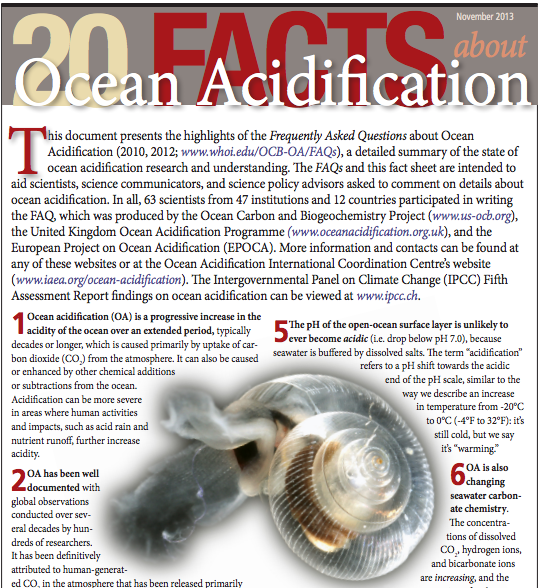

Tools for Effective Communication of Ocean Acidification Science and Policy
Washington Sea Grant, in partnership with state, federal (NOAA) and international scientists and communication experts have released two ocean acidification fact sheets as aids for scientists, science communicators and science policy advisors asked to comment on acidification: “20 Facts About Ocean Acidification” (Nov 2013. revised Feb 2014) and “Ocean Acidification in the Pacific Northwest” (May 2014). They have also been instrumental in the development of NOAA's Sharing Ocean Acidification Resources for Communicators and Educators (SOARCE) webinar series (8 presentations in 2014).
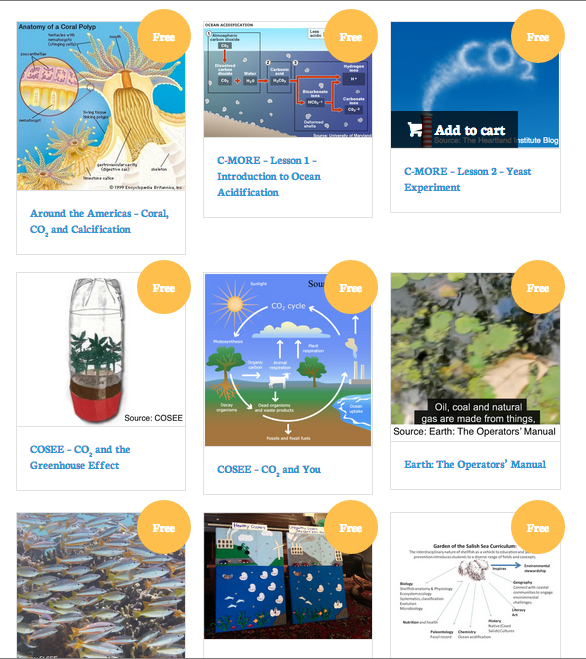

Ocean Acidification Education Tools for K-12 Classrooms
Washington Sea Grant, in partnership with the Suquamish Tribe, and with assistance from teachers, and state and academic education specialists, is developing a curated online collection of Ocean Acidification curricula, teaching tools, and informational resources for high school, middle school and elementary classrooms. The online collection, which will launched in Oct 2014, can be searched using a variety of filters, such as grade band, subject, type of material (i.e. lab activity, presentation, reading and analysis, etc.), and length of activity. This effort supports coastal resilience by building ocean acidification literacy.